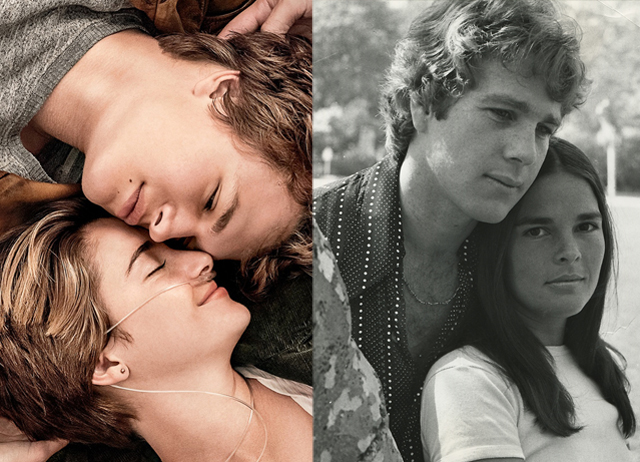
Valentine’s Day; a long time traditional holiday celebrating the act of love and expressing love to others. Everyone around this time of year is either preparing something special for their loved one, or are sending many valentines out to those that matter to them as an expression of their appreciation. Either way, this is the season when romance is at the forefront and Hollywood knows very well how to focus on this time of year. Romantic movies often are prepped for early February in order to take advantage of the date night crowds that you’d expect would be turning up at all the local theaters. They usually run the full spectrum from romantic comedies, to romantic tragedies, to opposites attract romances, to puppy love romance. Sometimes there is even romances from unexpected places, like between two robots in Wall-E (2008) or between a man and his AI assistant in Her (2013). One or more of these will usually end up coming out around Valentine’s Day each year, although this year isn’t giving us much to look forward to with Fifty Shades Darker. The unfortunate thing with romantic themed movies generally is the often difficult balance of tone that makes or breaks many of them. Romantic movies, when done right, can touch audiences of all types, but when they are not (and this happens a lot) it can be infuriatingly off point. Too many romantic films will tend to be too sentimental, or not have enough sentimentality, or in some extreme cases, fall into some really bad taste. You often see too many romance that are too corny for their own good, and it’s usually the fault of lazy writing, or mistakenly believing that audiences will feel as strongly about these themes as the filmmakers do. And that’s when you fall into the worst kinds of romantic films the pretentious kinds. And if there is sub-genre of romance that falls victim to pretension far too often, it’s the ill-fated romance.
Hollywood loves to exploit il-fated romances in movies, because it’s a mostly sure fire way to illicit tears from their audience. It’s the kind of movie that establishes a perfectly compatible couple falling deeply in love, destined to live the rest of their lives together, and through plot contrivances both small and grand, pulls the couple apart and dooms them to forever wonder how things could have been different. When people go to see a romantic film, their hope is to see love triumph in the end, so when a movie denies them this, it creates an even more intense response to the story and characters within the film; hoping for any sign of hope. It’s not always a bad thing for movies to exploit this in a romantic movie. Perhaps the greatest romantic film ever made, Casablanca (1943), concludes it’s story with it’s ideal couple split apart at the end, and as the movie states, it’s for the benefit of the world that they remain apart. Doctor Zhivago took the ill-fated romance to even more epic heights, with lovers torn apart by suffering and having their happy ending undone by the systems that overpower them. And of course, there is Titanic (1997), which is the quintessential ill-fated romance. But, even though those movies succeeded, it was largely due to the fact that they were telling larger than life stories where finding eternal love would be put more to the test. Hollywood sometimes makes the mistake of thinking any tragedy in a romantic film will guarantee cinematic gold, and that’s when we see more of the ill-fated romances that fail to live up to that goal. One particular sub-genre of this type has been romances centered around death, and in particular, the inclusion of terminal illness into a relationship. There have been two famous romantic films in particular, from two very different eras, that has played around with this plot device, and it’s led them to varying degrees of success both commercially and critically. Those movies in question are 1970’s Love Story, and 2014’s The Fault in Our Stars.
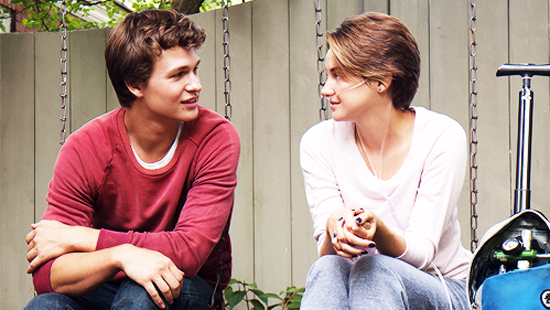
“I fell in love with him the way you fall asleep; Slowly, and then all at once.”
On the surface, both movies have little in common, plot-wise or with tone. Love Story, directed by Arthur Hiller and starring Ryan O’Neal and Ali MacGraw, is an opposites attract connection between a rich, aristocratic young Harvard student who falls in love with a working class girl that he met at the school library. They quickly fall in love, admiring each other’s intellect over their social status. After getting married and starting their plans for the future, Ali MacGraw’s Jenny suddenly becomes incurably ill, and their fairy-tale romance is over just before it could ever take hold. The Fault in Our Stars, based on the novel from best-selling author and popular internet vlogger John Green, begins and ends with the aura of death weighing over the minds of it’s characters. It is about two teenagers, Hazel (played by Shailene Woodley ) and Augustus (played by Ansel Elgort), who are both dealing with terminal cancer, and end up falling in love after meeting at a cancer patient support group. Though both are unrelated, they nevertheless follow the same formula of milking audience sympathy through the presence of tragic illness. You would think that it makes both movies pretentious and cynical, because it’s such an obvious ploy for tug at the heartstrings of their audiences. But, I do have to say that what ends up separating the two is the fact that one movie plays this card better than the other. You would think that it’s the elder of the two, since it’s the movie that actually wrote many of the cliches that we find in so many ill-fated romances today, but no. The Fault in Our Stars actually is the better of the two, and that’s only because it does a better job of being more honest with it’s intentions. Love Story, on the other hand, is so heavy handed in it’s delivery, that it undermines any sympathy that it was ever trying to mine from it’s audience.
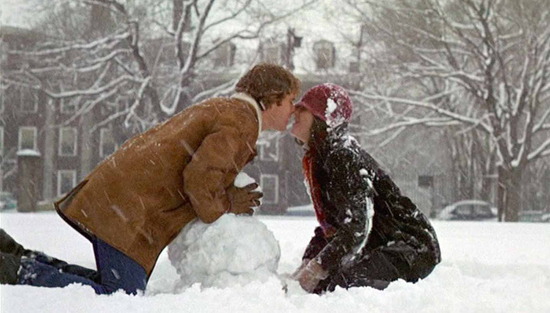
“Someday you’re gonna have to come up with the courage to admit you care.”
I’ll just come right out and say that I think that Love Story is a terrible film. I don’t think I’m breaking new ground with that statement. The movie was largely panned across the board when it was first released too. But, it was also a huge box office hit as well. That’s the only reason why we still talk about this movie today. It may have been pandering and obscenely cynical in it’s intentions, but it was effective. It’s like what we see with movies like Transformers (2007) in the action film genre. Those films continue to become lazier in their storytelling and more shameless in their pandering to the audience with every new installment; enough to enrage anyone who wants to hold up film-making to a higher standard. But, as long as they continue to make money, the less they’ll be willing to try harder. Love Story is the Transformers or romantic movies; a big, aggressive pile of mediocrity that somehow has prospered and has left it’s mark on the industry. Since it’s release, Hollywood has continued to look around for their next Love Story, and it created the awful trend of making pandering romantic films that never earn the right to bring their audiences to tears. How many times do we see death or illness shoehorned into a romantic movie, just for the sole purpose of eliciting cheap sympathy points. You can blame Love Story for inspiring most of those junk food Nicholas Sparks novels that we’re inundated with every year. But, out of Love Story’s legacy, we also get a movie like The Fault in Our Stars. Stars is by no means a perfect movie either, since it does it’s own fair share of pandering as well. But, there is a sincerity to it that helps it to rise above. It’s tonally more consistent, it’s characters are more authentic, and it more importantly never tries to pull the rug out from under it’s audience.
Let’s examine tone for a moment, especially with regards to how each movie deals with the theme of tragedy in their respective stories. For most of it’s run-time, Love Story is just about the act of love, and not about the external forces that bring them together. We see that the characters love each other, but nothing is ever understood from that. We are never shown why it’s so important for these two to be in love. The movie just seems to be one big windup to the inevitable tragic conclusion, and that’s why it feels so cheap. A lot could’ve been mined from the story to make the tragedy more poignant, like having the couple maybe doubt their relationships before ultimately growing closer together again through tragedy. But no, it’s all fairy-tale romance and then sadness and despair, with nothing in between. Basically the movie’s message is that life is not fair because fate tore two happy people apart. The Fault in Our Stars deals with the specter of death in a different way by putting it front and center. The characters are not blind-sided by tragedy; it’s an everyday reality that they all have to deal with. It’s the time that they have before the inevitable that becomes the driving force of their love. For Hazel and Augustus, love is not about defying the odds and making the world notice how much they adore one another. It’s about being there through the hardest days of your life and knowing that you are not alone. How is it possible that a romance between teenagers has a more mature attitude towards love than the movie about two college aged adults. Stars has it’s tug at the heart-string moments too (some cringe-worthy) but it earns most of them. And that’s because it’s more upfront with it’s tone. You know that the couple at it’s center is doomed, and they know it too. For them, it’s a love about the precious element of time, and not wasting it consumed with grief and believing that life isn’t fair.
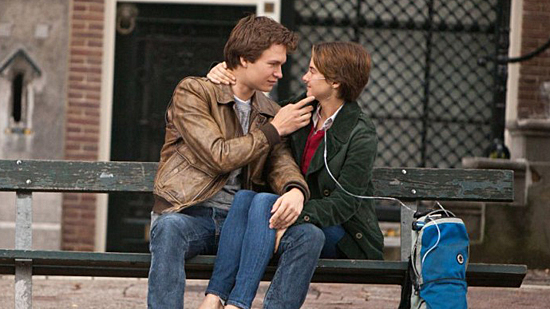
“You put the killing thing right between your teeth, but you don’t give it the power to do it’s killing. A metaphor.”
The characterizations do a lot to help define each movie as well. I for one despise the character of Oliver Barrett IV, played by Ryan O’Neal in Love Story. This preppy, rich white boy is about as mature as a whiny child, and any attempt by the movie to make feel sympathy for him fails in a big way. He loathes the privileged life that his wealth and name has given him, and yet he still views himself with an air of superiority. He doesn’t ask for a dime from his father, but feels persecuted when his university doesn’t give him a head start over other students with financial aid. Ali MacGraw’s Jenny is not much more likable; claiming to be independent minded, and yet she’s submissive to the desires and choices made by her eventual husband. The fact that they are also intellectual snobs also contributes to the loathsomeness of their characters, and it all ends up making me feel lees involved in their story arc overall. Truth be told, both Love Story and The Fault in Our Stars are romances between a bunch of privileged white people, but Stars never adds this underlying bogus sense of persecution that Love Story adheres to. What I do love about the characters in Fault in Our Stars is the fact that they always cherish the fact that they’ve made it through another day. Life has been unfair to them, but they don’t lash out because of it. What makes Hazel and Augustus appealing as characters is the fact that they try to always put the most positive spin on things. They use gallows humor a lot in the story, and it’s done in an endearing way. Whether it’s Augustus joking about his one leg, or Hazel saying she’s so excited that she can hardly breathe, it shows that these are two people defined by their situation and that they are not ashamed of the cards they’ve been dealt, making them much stronger overall.
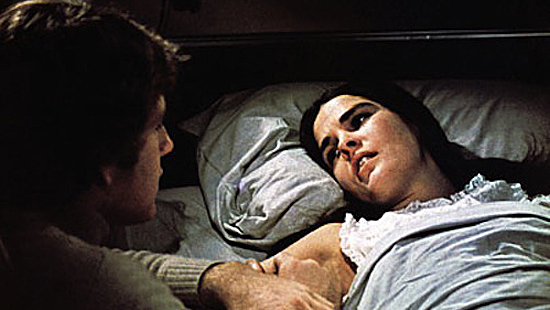
“Love means never having to say you’re sorry.”
There’s also the fundamental flaw of pretension that also makes Love Story a loathsome film overall. The above quote is what the movie is most known for and it is a notoriously awful statement about love that essentially spells out the cynical motive behind this movie. It’s the kind of statement that’s supposed to be a fix-all to every hardship that that the characters deal with and intends to reinforce the idea that love conquers all. But, it’s not the case. Love is powerful, but it needs support, and it’s a support that shouldn’t be dismissed as unimportant. After driving his wife away after an argument, Oliver goes out searching for Jenny, only to find her waiting for him back at home. He says he’s sorry, but she answers with the above statement. It’s as if to say, you did something bad, but you don’t have to answer for it because we have love and that’s what makes it all better. It’s enough to make me scream at the movie to say, “That’s not how love works!!” Love is about finding the common ground between you and your partner, and helping to bring out the best in one another. Here, Jenny just put adoration over common sense, not asking Oliver to change but instead conforming to what he wants out of her. It doesn’t surprise me in the least, that this movie was written by a man and told from the man’s point of view. Fault in Our Stars is also written by men, both in the source and screenplay, but it gives the point of view to the female voice and allows her to have her own say. Most insultingly, Love Story concludes with Oliver repeating the words to his father, as if to say, “you couldn’t understand our love, so saying sorry means nothing.” If I was Oliver’s father, I would have slapped him for saying that. That’s the rage that this movie has put me in. Contrast this with a moment in Stars between Hazel and her mother (played by Laura Dern), where the mom explains how she intends to live with grief and that it should be a feeling that Hazel should share. It’s a touching moment that reinforces the idea that love is all about understanding, and it is the antithesis to Love Story’s cynical and selfish view.
So, despite it’s long-lasting legacy, Love Story is far from a great romantic film. It’s a cynical, formulaic piece of junk food that hit all the right buttons in order to become a success. The Fault in Our Stars plays by the formula as well, but with far less cynicism. It has charm, wit, and a fair share of genuine heartfelt moments. That’s why when stacked up against one another, there is no contest between which is the better film. I think the best thing about The Fault in Our Stars is how it goes out of it’s way to more honest with it’s audience, as opposed to Love Story. It doesn’t try to sneak tragedy into it’s story and instead puts the theme right up front for the audience, letting them know that it will only be a matter of time for these characters. I also admire the fact that with a story centered around characters that are doomed to die young, it is a surprisingly cheerful movie for the most part. You despair in the fact that Hazel and Augustus only have a short time together, but you are also inspired by the fact that they made the most of that time. Compare that to Oliver and Jenny, who spend most of their time together complaining that the world doesn’t understand them, and then lament the fact that life hasn’t been fair. You found each other; that should be enough to tell you that some things in your life has been good. Both movies unfortunately stand out as being the quintessential love story of each of their respective generations, both of which are among the most self-indulgent that we’ve ever seen in our culture; the baby boomers and the millennials. But, Fault in Our Stars succeeds because it runs contrary to the attitudes of it’s generation and shows to it’s audience the ideal of what love can truly be, which is hope and compassion in the face of hate and tragedy. That’s ultimately what makes The Fault in Our Stars a better love story than Love Story, and it’s the ideal kind of date movie that should be watched on any Valentine’s Day.
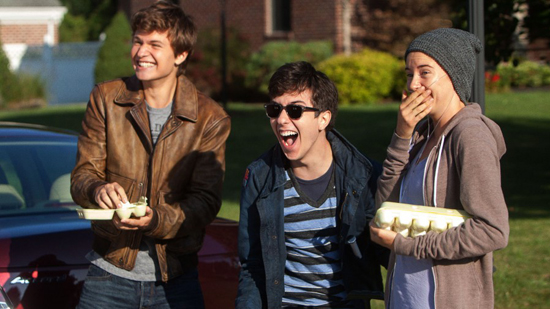
“I cannot tell you how thankful I am, for our little infinity. You gave me a forever, within the numbered days. And for that I am eternally grateful.”